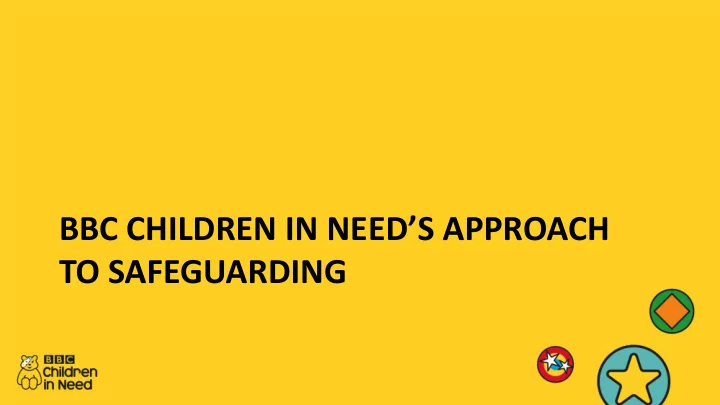

BBC CHILDREN IN NEED’S APPROACH TO SAFEGUARDING
BBC Children in Need Vision “ Every Child will have a safe, happy and secure childhood and reach their potential”
BBC Children in Need Grant Making Approach Assessment that Relationship Positive support Minimum tests “lived” Encouragement based grant for incident standards safeguarding to disclose management management systems Learning
Safeguarding Minimum Standard • Safeguarding policy in the applicant organisation’s own name. • Named safeguarding representative within the organisation. • Safeguarding training for all staff, volunteers, who have face-to-face contact with Children and Young people: • Training must be appropriate to the nature of the work and must be refreshed regularly. • Training should cover both safeguarding best practice and a briefing on the organisation’s safeguarding policies and procedures • All people working with children are subject to relevant background checks i.e. Disclosure & Barring Service, Disclosure Scotland or Access NI. This includes all staff, management committee, trustees or volunteers, who have direct access to children. Checks must be refreshed regularly • Safeguarding Children policy includes clear steps to take in the event of an incident or disclosure, including who to inform and how to contact them.
Assessment 1) Perform effective due diligence on projects requesting funding o Applications meet a minimum standard o Project culture and design ensure the welfare of children o Safeguarding practice is commensurate with project risk – one size does not fit all o Projects have effective policy and culture to manage any disclosures or safeguarding incidents o Flag any immediate risks to children
Additional Resources NSPCC are BBC Children in Need’s core partner in the promotion of good safeguarding practice • https://www.nspcc.org.uk/services-and-resources/research-and-resources/2017/are-they-safe/ • https://www.nspcc.org.uk/what-you-can-do/get-expert- training/?_t_id=1B2M2Y8AsgTpgAmY7PhCfg%3d%3d&_t_q=training&_t_tags=language%3aen%2csiteid %3a7f1b9313-bf5e-4415-abf6- aaf87298c667&_t_ip=132.185.161.131&_t_hit.id=Nspcc_Web_Models_Pages_StandardPage/_4f32ba7 a-ffd4-4627-a0b7-b6e21d4821cb_en-GB&_t_hit.pos=1 SCIE also provide a comprehensive selection of research and training on Safeguarding and Adult Protection • https://www.scie.org.uk/ • NCVO - https://events.ncvo.org.uk/event_series/managing-adult-and-child-safeguarding-in-your- organisation • Children in Scotland - https://childreninscotland.org.uk/wp-content/uploads/2017/04/Child- protection.pdf Children 1 st - https://www.children1st.org.uk/help-for-families/safeguarding-in-sport/training/ • All local authorities, the Scottish and Welsh Governments also provide guidance and training materials
Digital Resources Useful Resources NSPCC Training - https://learning.nspcc.org.uk/training/introductory/keeping-children- safe-online-online-course/ NSPCC Guidance on running safe online services with children - https://learning.nspcc.org.uk/safeguarding-child-protection/online-safety-for- organisations-and-groups/ Ineqe – Digital safety webinars on specific social media platforms - https://ineqe.com/webinars/ General advice on staying safe online - https://www.saferinternet.org.uk/ BBC resources for managing your digital life - https://www.bbc.com/ownit CEOP – raising concerns about online abuse - https://www.ceop.police.uk/safety-centre/
Recommend
More recommend